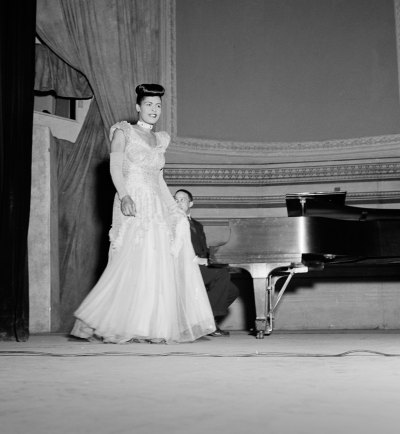Billie Holiday had reasons to sing the blues. Abandoned by her father and raised in Harlem by her often-unemployed mother, “we were starving,” Billie recalled. But she learned how to survive. At age 14, she walked into the Log Cabin Club and told the owner she could sing. “An old guy playing a piano… struck ‘Travelin’ and I sang. The customers stopped drinking. They turned around and watched…. That’s how I got my start,” she said. “First thing I did was get a sandwich. Mother and I ate that night, and we have been eating pretty well since.”
In a life shaped by poverty and later by drug addiction and abusive relationships, Billie nevertheless found power in her unique voice. As tumultuous as her life was off stage — she faced bitter racism, and her career was derailed by a drug conviction — she remained completely confident about her music. “Billie was an incredibly strong person,” says James Erskine, director of the 2020 documentary Billie. “She may have been previously portrayed as a victim, but she was actually somebody who really most of the time triumphed against the odds.”
The daughter of unwed teenage parents, Billie dropped out of school at 11. She soon started singing. Her first producer, John Hammond, said she “sang like an improvising jazz genius.” Her career took off with songs like “God Bless the Child” and her devastating classic “Strange Fruit,” but she was confronted with heckling and racial discrimination.
While touring with bandleader Artie Shaw, she said, “Artie wouldn’t let me sit out front with the band.” She often had to use service elevators. “I was never allowed to visit the bar or the dining room as did other members of the band,” Billie recalled. Still, she remained true to herself, and when Shaw offered her a five-year contract, she refused. Billie recognized her worth. “She knew how she wanted to sound,” Count Basie once said, “and you couldn’t tell her what to do.”

Married three times, her first husband, Jimmy Monroe, likely introduced her to opium. Not long after their 1947 divorce, she was arrested and jailed for narcotics possession. “It’s a violent society through which she emerges,” explains Erskine. After prison, she was barred from singing in New York clubs serving alcohol. She continued to perform, though, including a sold-out Carnegie Hall concert. One critic praised her “assurance of phrasing and intonation,” as well as her “eagerness to reach out and touch the audience.”
By 1959, Billie’s health had declined, and she was locked in an abusive marriage with mob enforcer Louis McKay. Hospitalized with cirrhosis, she again was arrested for drugs by cops who handcuffed her to the bed. She died there a month later at age 44.
Just days before she passed, Billie talked about the strength and tenacity for survival that had carried her through life. “When you’re poor and Black, you’re born into a world that turns your heart into a tin can and anyone who is in the mood swings out and kicks you,” she said. “[But] when the ‘meaning’ in you screams for you to make your stand, you make your stand straight and strong.” For Billie, that stand was to sing like no other, before or since.
